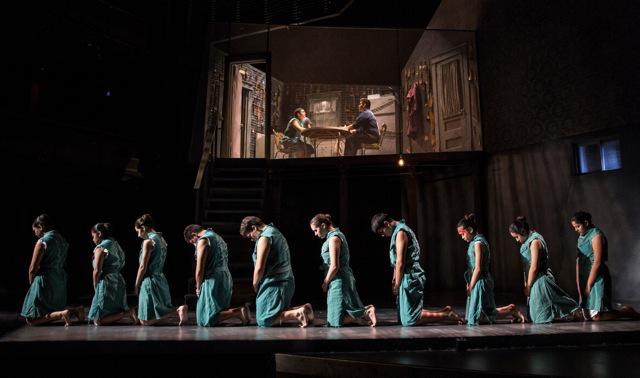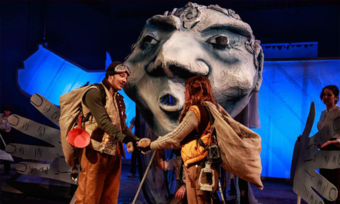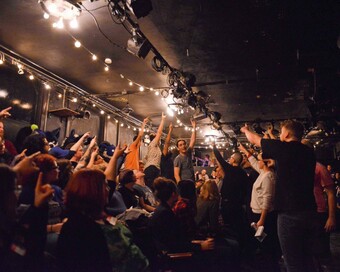Exemplary Youth Theater in Albany Park Theatre Project’s God’s Work

Albany Park Theatre Project (APTP) is a multiethnic youth theater ensemble directed by David Feiner with Stephanie Paul, Maggie Popadiak, and Rossana Rodríguez Sánchez. Its members live in the diverse working class neighborhood of Albany Park, on Chicago’s northwest side; many begin work with the group in the eighth grade and continue through high school. Ensemble members not only receive intensive artistic training in acting, physical theater, and playwriting to enable them to create high quality theater in the company’s physical, metaphor-driven aesthetic, but APTP provides academic tutoring, college counseling, a safe space to hang out, open access to a kitchen stocked with snacks and food to prepare simple meals, and hot dinners on full rehearsal days, during tech, and before performances.
Youth theater is often viewed more as education than art. If the general theater audience does not expect plays devised by teenagers to possess aesthetic excellence, high production values, and sophisticated storytelling, then the Albany Park Theatre Project defies such expectations. A student might work with APTP between six and forty hours each week for up to five years, and veteran ensemble members have been thoroughly trained in physical theater and devising techniques. Their work stands up aesthetically to that of any small professional theater in Chicago, a city of many excellent small professional theaters.
If the general theater audience does not expect plays devised by teenagers to possess aesthetic excellence, high production values, and sophisticated storytelling, then the Albany Park Theatre Project defies such expectations.
As testament to this, God’s Work, a piece devised by the ensemble in 2006 and now re-mounted with fresh cast, design, choreography, and score, was presented at the Goodman Theatre as part of its season from April 4-19. This is the fourth APTP production to transfer or be remounted at the Goodman in five years, including Home/Land (2012), Feast (2010), and Aquí Estoy (2008). I’m an unabashed fan of the ensemble’s work and will loudly proclaim to anyone who will listen that I think it the best youth theater in the country. I found this production extremely moving; images and moment hung with me for days after seeing the performance.
God’s Work tells the story of Rachel (Maidenwena Alba), “the lucky one” of eighteen siblings raised in a basement by an abusive, fundamentalist father. It utilizes movement, puppetry, and moments of expansive theatricality to evoke the horrors of an abusive childhood and moments of pleasure in which the children use fantasy to escape their circumstances. On the Goodman’s Owen stage, a two-story house designed by Scott C. Neale depicts a kitchen filled with torture devices—paintbrushes of all shapes and sizes—with which the Father (Vincent K. Meredith) metaphorically abuses the children. He paints limbs black-and-blue in harsh strokes, cheeks dripping red as if slapped. A line of children in striped uniforms awaits punishment for their confessed sins—“sins” as mundane as forgetting to do the dishes or bringing food home from school, standing quietly below the towering staircase leading to Father’s kitchen.
Rachel, however, remembers a utopian space in which a loving couple Peter (Jalen D. Rios) and Irene (Ely Espino) sing lullabies, play with bubbles, and videotape a toddler’s first steps. This half-remembered memory, rendered with bunraku puppets designed by Brandon and Lacy Katherine Campbell, appears at first behind scrim, later spilling out into fuller view. This dream of a happy family—as we come to learn, a family she lived with for nine months as a toddler—stands in opposition to her daily struggles in Father’s basement. Ultimately, Rachel is able to go live with this family permanently. Peter and Irene wash away the remnants of the paint left by Father’s painful brushes, metaphorically baptizing Rachel with bubbles and love as she is reborn into a space in which she can grow up both safe and loved.
Rachel lands somewhere safe, but we do not learn the fate of her siblings, although the closing image of the play includes their shadowy figures—now in street clothes rather than uniforms—scattered throughout the house of the Owen Theater, as if their new lives continue somewhere unknown.
APTP’s last two pieces, Homeland (2012) and I Will Kiss These Walls (2013), both deal with large political issues—immigration and the housing crisis, respectively—focusing on the ways structural problems impact the plays’ teenage protagonists and the lives of people populating their communities. God’s Work is a different kind of piece, operating as a metaphoric fable rather than an ethnographic examination of child abuse. Its use of puppets and visual metaphor intentionally abstracts the family dynamic, populating the world with allegorical characters. A fundamentalist Christian Father is cruel, a constantly pregnant Mother is cowed, and Rachel and her siblings take care of each other as best they can. The story focuses tightly on the family unit—no teachers notice the children covered in grime and bruises at school, no neighbors inquire as to why eighteen children live in a basement and are not allowed outside. The children themselves must find ways to create spaces of imagination and play in which they can claim ownership of the dingy basement in which they are forced to live. It is a story of resilience and survival.







Comments
The article is just the start of the conversation—we want to know what you think about this subject, too! HowlRound is a space for knowledge-sharing, and we welcome spirited, thoughtful, and on-topic dialogue. Find our full comments policy here
Agreed! Love them. Another teensy tiny correction: The acronym for Albany Park Theatre Project is APTP, not ATPT.
Great piece about a great show! One teeny correction, though: Albany Park is on the northwest side. The northeast side of Chicago is a bit, um, soggy. ;)
Correction made. Thanks!